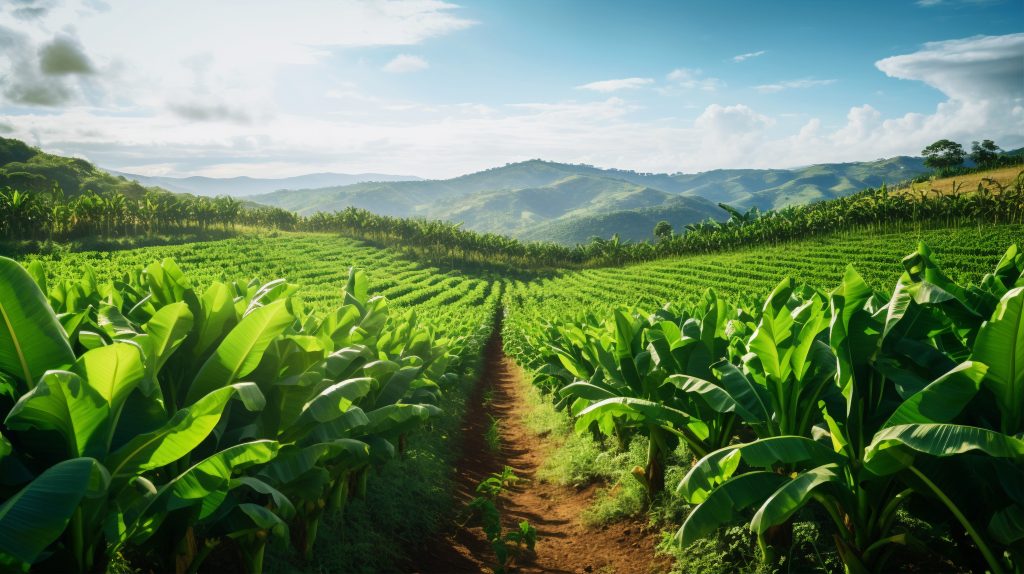1. Introduction:
Nigeria’s agricultural landscape holds immense potential for the development of a thriving plantain plantation farming sector. This proposal outlines a detailed strategy for establishing and managing a sustainable plantain plantation business in Nigeria, focusing on innovation, scalability, and socioeconomic impact.
2. Background:
Plantain is a staple food crop in Nigeria, cherished for its nutritional value, versatility, and cultural significance.
The demand for plantain continues to rise, driven by population growth, urbanization, and changing dietary preferences.
Despite its importance, Nigeria’s plantain sector faces challenges such as low productivity, post-harvest losses, and limited value addition.
3. Objectives:
Establish a modern plantain plantation that implements best agronomic practices, leveraging technology and innovation to optimize productivity and sustainability.
Empower local communities by providing employment opportunities, promoting inclusive growth, and fostering skills development along the value chain.
Enhance food security and income generation by diversifying plantain products and accessing high-value markets, both domestically and internationally.
Contribute to Nigeria’s agricultural transformation agenda by promoting value addition, industrialization, and rural development.
4. Strategy:
4.1 Site Selection:
Conduct thorough land assessments to identify suitable sites with fertile soil, adequate drainage, and access to water sources. Prioritize areas with favorable climatic conditions and proximity to markets and processing facilities.
4.2 Sustainable Practices:
Implement sustainable farming techniques, including soil conservation, integrated pest management, and organic fertilization, to improve soil health, conserve water, and minimize environmental impact. Embrace precision agriculture technologies to optimize resource use and enhance productivity.
4.3 Community Engagement:
Forge partnerships with local farmers, cooperatives, and extension services to facilitate knowledge transfer, provide access to inputs and credit, and promote inclusive participation in the value chain. Establish training programs on modern farming techniques, entrepreneurship, and quality control standards.
4.4. Technological Innovation:
Harness digital solutions such as remote sensing, weather forecasting, and mobile apps for real-time monitoring of crop growth, disease detection, and yield prediction. Explore opportunities for tissue culture propagation and genetic improvement to develop high-yielding, disease-resistant plantain varieties.
4.5. Value Addition:
Establish processing facilities for plantain chips, flour, and snacks production, adding value to raw plantain and creating additional revenue streams. Develop partnerships with food processors, snack manufacturers, and retailers to stimulate demand for plantain-based products and expand market reach.
4.6. Market Expansion:
Diversify market channels by targeting domestic consumers, food service industries, and export markets. Explore opportunities in regional trade agreements and international market access to capitalize on Nigeria’s competitive advantage in plantain production.
5. Financial Projections:
Initial Investment: Breakdown of capital expenditure for land acquisition, infrastructure development, equipment procurement, and operational costs.
Revenue Forecast: Projections for plantain yield, product pricing, and sales volumes based on market analysis and demand trends.
Profitability Analysis: Financial modeling to assess return on investment, net present value, and internal rate of return over the project lifecycle. Consider sensitivity analysis to evaluate the impact of price fluctuations, input costs, and yield variations.
Risk Management: Identification of potential risks such as market volatility, climate variability, and policy changes, along with mitigation strategies to minimize exposure and safeguard business continuity.
6. Conclusion:
The proposed plantain plantation farming venture represents a strategic opportunity to nurture growth, drive sustainable development, and create shared prosperity for Nigeria’s rural communities and the nation as a whole. By embracing innovation, sustainability, and inclusive development, we can unlock the full potential of plantain as a key driver of economic transformation and food security.
7. Next Steps:
Engage relevant stakeholders, including government agencies, financial institutions, research institutions, and local communities, to garner support and facilitate partnerships.
Develop a comprehensive project implementation plan, including timelines, milestones, and performance indicators, to guide execution and monitoring.
Continuously evaluate and adapt strategies in response to market dynamics, technological advancements, and stakeholder feedback, to ensure the long-term success and sustainability of the plantain plantation farming venture.

